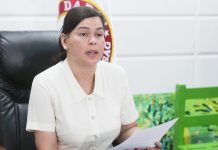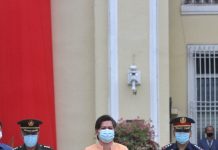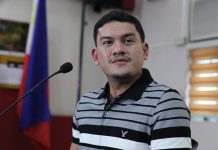Noting that the register of deeds (RDs) in the Davao region remains in the top five with highest in demand nationwide, Aster E. Cruzabra, Davao City registrar of deeds, told Edge Davao that real property estates are a key indicator of economic progress which means more and more investors are coming to the city.
Saying that the number of land titles released in the city has been increasing each year, she added, “The real estate industry in the city is very promising as real estate economics is a strong fundamental economic indicator.”
Cruzabra said that part of this progress is the integrity of the Torrens system, “a system for recording land titles under which a court may direct the issuance of a certificate of title upon application by the landowner.”
“Kung wala nay banko modawat og land title as collateral, something must be wrong. Samtang naa pay nagadawat nga bangko, there is integrity sa Torrens system. The duty of LRA is to protect this integrity,” she added.
The city has more than 700,000 land titles, according to her, mainly in subdivision development housing. The city government recently awarded 3,000 individual land titles in such locations as National Housing Authority subdivisions and Sandawa.
“It is the mayor’s (Sara Duterte) flagship,” Cruzabra said.
Automated
Determining whether the business climate in Davao has become favorable can now be easily ascertained as land title transactions have gone automated – with figures easily obtained with the click of the mouse, Cruzabra said earlier.
“Actually, our real property estate is really good, thanks to the support of our city government,” she said.
Land developers have the most transactions, according to her. There is a developer that had 2,700 splittings of a property, and that in Davao City alone, the NHA had 2,500 such splittings.
Accepting an average of 70 to 80 transactions a day in chattel, mortgage and real estate, Davao City RD can only accommodate 30, thus the backlog in unreleased land titles. Based on the updated activity details in August last year, the office had released 6,435 land titles, while the backlog in encoding consist of 1,180, and those pending for release, which lack some supporting documents, are at 50 percent.
However, as of press time, Cruzabra said 80% of scanned land titles have already been encoded into the database. Having conducted a time and motion study of the work flow in the RD, she added that backlogs are inevitable. “How do we address the problem of backlogs is to become paperless,” she said.
Through the Land Registration Systems, Inc. (LARES) headed by its president, Delfin T. Hallare, Jr., partner of the Land Registration Authority (LRA), the processes in land registration were already computerized as far back as December 2, 2009. Before becoming fully automated, the LRA admits, the transition process, particularly in creating the database, would depend on the activity of the RD. “Looking for titles in vaults takes a long time,” Hallare said.
For her part, Cruzabra said, “The delay is temporary because the employees are not yet that ready for the technology. We are still completing the database and the system is being updated from time to time.” Hopeful that it will be completed in two years, she added that comparing data from the vaults with the ones encoded in the computer will also take a little more time.
LARES, automating the processes through the Land Titling Computerization Project (LTCP) in a Build Own Operate (BOO) arrangement under the Build Operate Transfer (BOT) Law, had provided almost all facilities and renovates the RDs nationwide to complement the IT infrastructure and standardized processes of the automated system. It has automated168 RDs nationwide, constructed 13 and renovated 84.
Genuine land title detection, security
In a statement earlier sent by LARES, with the new computerized system, land titles are protected from loss due to fire, theft, natural disasters and the normal ravages of time because LARES is using security-tested document-imaging technology.
Cruzabra said the RD will no longer generate a hard copy of the original certificate of title (the Registry copy), instead, the original copy of the title shall be maintained in its original electronic form. She added that they can provide a printed copy of the electronic form, but cannot duplicate the original hard copy.
“Requests to obtain a new original copy will only be granted by a trial court based on a petition,” she said.
The automated system is also capable of providing a system of control to prevent overlapping or duplication of title by using modern digital mapping technology to create accurate and updated map sheets, and provide accurate, current and fast lot status verification. In addition, the system is also capable of timely detection and identification of fake land titles.
Even the registrar of deeds had to improvise her own way of detecting fake land titles. Cruzabra said, “You have to lick it, touch it and feel it,” adding that the paper used for land titles are exclusively released by the Bangko Sentral ng Pilipinas, the same government body that prints the country’s legal tenders.
While the land title costs only P90, each supporting document in land registration constitutes a fee of P268.80 that goes to LARES, the contractor binded to the state-run body for 10 years.
Players of deceit
While there is a fact finding mission undertaken by the LRA on fake land titles, the registrar of deeds herself has filed cases against players of deceit.
Cruzabra told Edge Davao last week that every now and then she receives statements and documents from different groups claiming ownership of land.
“Malingaw ka lagi. You’ll enjoy reading them,” she said, showing a sample of bogus documents compiled in a clear book with photocopies of seemingly authenticated documents.
Cruzabra cited several groups claiming that they are descendants of a Spanish family or some sultanate who owns the entire Davao City or Mindanao, while some even claim the entire Philippines, such as Bagong Lahi whose case had been brought to the committee of the Davao City Council.
She also mentioned GOD that stands for Government of Divinity, a group that once called her up telling her not to release a land title without getting the group’s consent because, according to them, “the land belongs to the Divine.”






